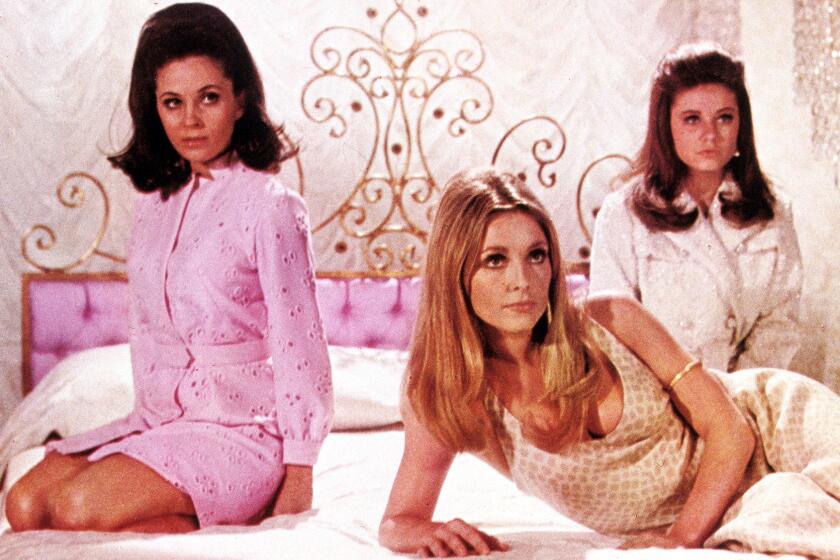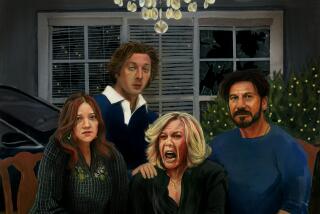Review: Carrie Fisher’s ex-assistant masters the tell-a-lot novel
If you buy books linked on our site, The Times may earn a commission from Bookshop.org, whose fees support independent bookstores.
Having covered the movie business for longer than I care to remember, and used to seeing stars routinely treated like royalty, their every whim indulged, I always wondered about the lives of the personal assistants who are at their beck and call 24/7, subject to humiliations that only Trump’s staff could know, with the sole reward being no more than a modest salary and the momentary flicker of reflected fame that lights their lives.
Details about the love-hate relationship that must exist between assistants and their wards are hard to come by, however — whether quashed by nondisclosure agreements or the prospect of being blackballed, thus faced with the daunting task of finding employment (doctor? teacher?) that might actually contribute to the public weal. That is, unless an assistant makes it onto the front page by dismembering his or her employer, as one is recently alleged to have done to tech entrepreneur Fahim Saleh. Alternately, one could read Byron Lane’s cleverly titled debut novel, “A Star Is Bored.”
The bad news is that it is indeed a novel, not exactly the tell-all I’ve been waiting for, but the good news is that despite Lane’s ingenious and very droll fictionalizations, it’s a tell-a-lot. Lane was the personal assistant to Carrie Fisher, and the book is being peddled as a roman à clef, but he denies that his bored star is based on Fisher so often and so insistently, it’s difficult to avoid the impression that he doth protest too much. He never lets us forget it, and can’t resist playing now-you-see-her-now-you-don’t with Princess Leia — or, as name-checked in the book, “Priestess Talaria,” ever recognized by fans for having defended the Earth from aliens in a famous movie. Outside of not-Fisher and not-Debbie Reynolds, however, there’s not that much to clef.
The film-critic narrator of his debut novel, “Antkind,” hate Charlie Kaufman, loves his mediocre successors and keeps falling into manholes.
Still, and here’s more good news: Lane turns out to be such a good writer, so funny and rapier sharp, that whether there is or isn’t doesn’t really matter. He’s made a fascinating character out of his perennially bored star, a pill-popping, foul-mouthed creature at once cynical and sentimental, self-loving and self-hating, with a lust for life and a self-destructive streak as wide as Santa Monica Boulevard. Her acerbic wit, contempt for proprieties and inspired gift for obscene locutions make her incapable of a pedestrian thought, gesture or word, starting with her assistant’s name, Charlie, which she instantly converts into “Cockring.”
Onto this confection of horror and humor Lane has layered Charlie’s own story, that of a young, once-suicidal gay man from the backwaters of Louisiana who is addicted to unsafe sex and loathes his abusive father for mocking his effeminate mannerisms (“running like a girl”) as well as making him wear his late mother’s panties.

Charlie ends up in Hollywood with hopes of salvaging some vestige of self-esteem. Wrong town, wrong profession, we might think, but when he gets a crack at a job as not-Fisher’s personal assistant, he goes for it. Walking up to her front door, he can’t help noticing that the brass knocker, resembling a scrotum, sits above a stained-glass panel displaying a priest getting serviced by an altar boy. Things get weirder from there.
Fortunately for Charlie, not-Fisher sleeps most of the time, and he imagines his duties will be no more taxing than to “feed her, water her, medicate her” and “make her wear a bra,” but these chores turn out to be the least of it. He routinely smells the armpits of her blouses to tell if they are dirty enough to go to the cleaners and sorts her panties by color.
“Apropos of Nothing” is a mixed bag of rich memories, harsh defenses and tone-deaf reveries.
Charlie falls in with others in the same boat; they form a loose Assistant Club, trading advice, war stories and the protocols of the personal assistant world. One member explains to him, “These jobs are not about doing … These jobs are about being … nothing is more important than — being there for them.” Like Charlie, the assistants are so colonized by their employers that even they don’t know one another’s real names.
A famous singer has two assistants, one for each coast, and calls them “East” and “West.” West thumbnails her world when she complains, “How nice it must be to see someone eating sautéed mushroom soufflé in a movie and then call your assistant to call the studio to call the director to call the writer to get the exact recipe from the screenplay and then have me go to the grocery store and buy the supplies and then cook it.”
The veterans of this trade instruct Charlie in the scams they run on their employers, rummaging through their closets for the valuable designer labels they no longer wear and selling them online. “It’s like printing money,” he’s told. He’s also advised to use his personal credit card to pay for the goodies they buy and get reimbursed by their accountants, all the while collecting enough points to circumnavigate the globe several times and cover the hotels and rental cars along the way.
Stephen Rebello’s “Valley of the Dolls” history, “Dolls! Dolls! Dolls!,” is only good if you think the movie is — which it’s not.
The book is not without its longueurs. There isn’t much plot (no murders, explosions, car chases), and every so often, I was inclined to leave Charlie and not-Fisher to their own devices, but the narrative invariably picks up, and Charlie’s deepening relationship with not-Fisher anchors the story, creating a bond that humanizes them both. Eventually, tired of subordinating his life to hers and afraid of becoming a “lifer,” Cockring reclaims Charlie and goes his own way. It’s a long goodbye, but in the course of it, each discovers a deep affection for the other they didn’t realize they shared.
With suicides and worse lurking behind every door, it’s a conventional happy ending to a story that could easily have turned ferociously ugly. It has straight-to-series written all over it (Netflix, take heed), but Lane earns his happily ever after. He gives us the best of both worlds, savage satire leavened with compassion. He exploits his relationship with his late employer but clearly cares deeply for her, and by the end, so do we. This reader was rarely bored.
Biskind is the author of many books, including “Easy Riders, Raging Bulls.”
A Star Is Bored
Byron Lane
Henry Holt: 352 pages, $27
More to Read
Sign up for our Book Club newsletter
Get the latest news, events and more from the Los Angeles Times Book Club, and help us get L.A. reading and talking.
You may occasionally receive promotional content from the Los Angeles Times.









